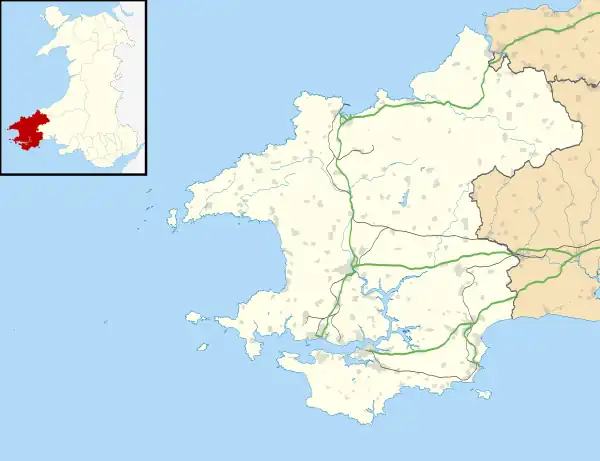Whitchurch
| |
|---|---|
 St David's Church | |
 Whitchurch Location within Pembrokeshire | |
| OS grid reference | SM799255 |
| Community |
|
| Principal area | |
| Country | Wales |
| Sovereign state | United Kingdom |
| Police | Dyfed-Powys |
| Fire | Mid and West Wales |
| Ambulance | Welsh |
Whitchurch (Welsh: Tregroes, lit. "Town of the Cross") is a small village and parish (Plwy'r Groes, lit. "Parish of the Cross") in north-western Pembrokeshire, West Wales.
Description
The settlement of Whitchurch is 1.2 mi (1.9 km) from the coast and 3 mi (4.8 km) east of St David's, and includes the parish church (also dedicated to Saint David) and a few houses. The largest settlement in the parish, which covers 3,138 acres (1,270 ha),[1] is Solva, whose own church is dedicated to St Aidan.[2] The parishes of Whitchurch and St Elvis make up the community of Solva.
History
By the churchyard gate is a standing stone called Maen Dewi, believed to be the lower part of a large Celtic cross.
Whitchurch was a chapelry in the parish of St David's before becoming a parish in its own right.[3] It is marked on a 1578 parish map held by the British Library.[4] A later, but pre-1850 parish map shows the extensive parish including several smaller settlements, including the village of Solva, in which there were numerous chapels.[5] Much of the land was still unenclosed in the 19th century.[3]
Whitchurch was in the ancient hundred of Dewisland and in the 1830s had a population of 1,028.[2] The population varied from 599 in 1801 to a maximum of 1,252 in 1851, then had fallen to 800 by 1961.[6]
Whitchurch and Solva share a War Memorial, on which the names of 50 parishioners are listed as having lost their lives in two world wars.[7] RAF St Davids was established in 1943, and operated until the 1990s.[8]
There is an unusually large number of listed buildings for such a rural area, many with mediaeval origins, including the Grade II listed parish church, mills, bridges and farm buildings.[3]
Notable people
The farm of Caerforiog, Whitchurch, is claimed as the birthplace of Adam Houghton (or Hoton), a 14th-century Lord Chancellor of England and Bishop of St Davids.[2] In 1856, a small building survived at Caerforiog with an ogee-headed doorway, possibly dating from the 14th century.[9]
Caleb Rees (1883–1970), was born at "Esgairordd", in Whitchurch, Pembrokeshire; he was a Welsh school inspector for over forty years and a writer on educational and ecclesiastical topics.[10]
References
- ↑ "GB Historical GIS University of Portsmouth: Whitchurch AP/CP through time: Population Statistics: Area". A Vision of Britain through Time. Retrieved 19 June 2020.
- 1 2 3 "GENUKI: Whitchurch". Retrieved 19 June 2020.
- 1 2 3 "Dyfed Archaeological Trust: St David's". Retrieved 19 June 2020.
- ↑ "Penbrok comitat". British Library.
- ↑ "GENUKI: Parish map 68". Retrieved 19 June 2020.
- ↑ "GB Historical GIS / University of Portsmouth, Whitchurch AP/CP: Population Statistics". A Vision of Britain through Time. Retrieved 19 June 2020.
- ↑ "West Wales War Memorial Project: Solva and Whitchurch". Retrieved 19 June 2020.
- ↑ "Dyfed Archaeological Trust: St David's Airfield". Retrieved 18 June 2020.
- ↑ W. B. Jones & E. A. Freeman, The history and antiquities of Saint David's (1856), p. 232
- ↑ James, M.A. (2001). REES, Caleb (1883–1970), inspector of Schools and author. Dictionary of Welsh Biography.